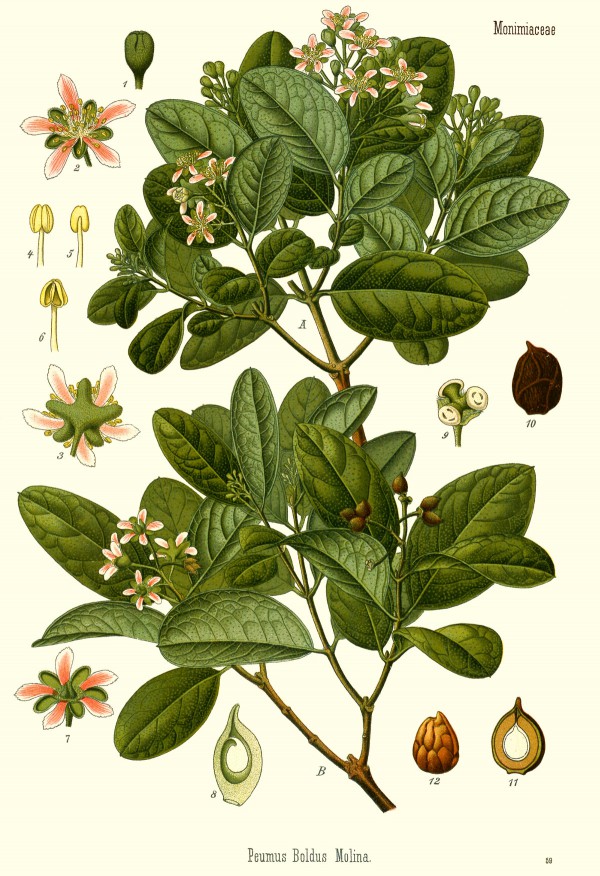Peumus boldus Molina - Monimiaceae - boldo, Boldo
Evergreen tree, native to Chile.
„Together with litre, quillay, peumo, bollén and other indigenous plants, it is a characteristic component of the sclerophyllous forest endemic to central Chile. Its leaves, which have a strong, woody and slightly bitter flavor and camphor-like aroma, are used for culinary purposes, primarily in Latin America… Boldo leaf also contains 2-4% of volatile oil. Major constituents reported as: ascaridole (16-38%)… Ascaridole is highly toxic, and this raises concerns about the suitability of boldo leaf in traditional herbal medicinal products.“ http://en.wikipedia.org/wiki/Boldo
„Essential oils obtained by hydrodistillation of leaves of P. boldus grown in Siena (Tuscany, Italy) and marketed leaves from Chile were investigated by GC-MS. Forty-six compounds were identified, accounting for about 98% of total content; 22 constituents were reported for the first time. Ascaridole, which is endowed with antihelminthic properties, was the main component (38.6% and 21.1 %, respectively). The Tuscan essential oil had a considerably higher percentage of eucalyptol.“
[Peumus boldus essential oil: New constituents and comparison of oils from leaves of different origin. Miraldi, E., Ferri, S., Franchi, G. G., Giorgi, G., Fitoterapia, Vol.67(3), 1996, 227-230]
„Sufficient data are available to develop a Community herbal monograph on the traditional use of Peumus boldus Molina, folium provided the indications are suitable for self-medication. The proposed indications are in accordance with the Commission E monograph (Blumenthal, 2000): Traditional herbal medicinal product for symptomatic relief of dyspepsia and mild spasmodic disorders of the gastrointestinal tract.
Duration of use should be limited to 2 weeks.
Use of boldo leaf is not recommended in children and adolescents and should be avoided
during pregnancy and lactation. Boldo leaf is contra-indicated where there is obstruction of the bile duct, cholangitis liver disease, gallstones or any other biliary disorder that would require medical supervision. The use of comminuted herbal substance as such and of ethanolic extracts of boldo leaf are not considered acceptable for traditional herbal medicinal products in view of the potential risks associated with the toxic ascaridole constituent.“
[Committee on Herbal Medicinal Products (HMPC) (2009). „Assessment Report on Peumus boldus Molina, Folium“ (pdf). European Medicines Agency.]
https://www.ema.europa.eu/documents/herbal-report/superseded-assessment-report-peumus-boldus-molina-folium_en.pdf
„The essential oil from Peumus boldus showed potent insecticidal properties (LC50 = 6.26 mg/dm3). According to GC and GC/MS analysis, 1,8-cineol (36.72%); p-cymene (26.79%); ascaridol (6.25%); sabinene (5.10%); 4-terpineol (4.39%); β-pinene (4.16%) and limonene (2.68%) were the principal components of the EO. The EO from Peumus boldus seems promising as a natural insecticide against houseflies.“
[Urzua, Alejandro, et al. „Insecticidal Properties of Peumus boldus Mol. Essential Oil on the House Fly, Musca domestica L.“ Boletín Latinoamericano y del Caribe de Plantas Medicinales y Aromáticas 9.6 (2010)] http://www.redalyc.org/pdf/856/85615688006.pdf
„The leaves of the Chilean medicinal plant Peumus boldus (Monimiaceae) have been used as a herbal remedy by the indigenous people for a very long time. Today extracts of boldo leaves are used in Europe as traditional medicine for the treatment of liver and gastrointestinal complaints and also in homeopathic preparations. Apart from isoquinoline alkaloids of the aporphine type, especially boldine, polyphenols (flavonoids, proanthocyanidines, cinnamoic acid derivatives) as well as an essential oil have been elucidated. In vitro and in vivo studies demonstrated amongst others antioxidative, anti-inflammatory, hepatoprotective and spasmolytic activities, which at least in part give an explanation for the traditional use. However, clinical studies confirming these activities are missing. Due to the toxicity of ascaridole, a prominent component of the essential oil, only aqueous extracts or infusions of boldo leaves or homeopathic preparations should be applied in therapy.“
[Boldoblätter. Latté, Klaus Peter., Zeitschrift für Phytotherapie, Vol.35(1), 2014, 40-46]

Peumus boldus Molina; Köhler, F.E., Medizinal Pflanzen, vol.3 t.59 (1890)
http://botanicalillustrations.org/species.php?id_species=773321
